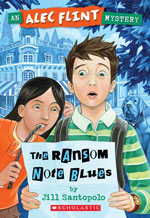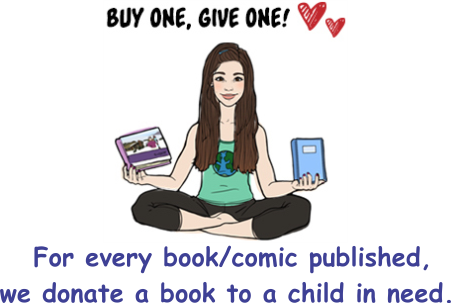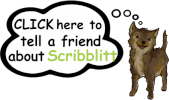 Jill Santopolo is a novelist, a writer, and a teacher. Her books The Nina, The Pinta and The Vanishing Treasure and The Ransom Note Blues are both published by Scholastic's Orchard imprint. She received a BA in English Literature from Columbia University and an MFA in Writing for Children and Young Adults from the Vermont College of Fine Arts. She currently lives in New York City, surrounded by mischief, mayhem and manuscripts.
Jill Santopolo is a novelist, a writer, and a teacher. Her books The Nina, The Pinta and The Vanishing Treasure and The Ransom Note Blues are both published by Scholastic's Orchard imprint. She received a BA in English Literature from Columbia University and an MFA in Writing for Children and Young Adults from the Vermont College of Fine Arts. She currently lives in New York City, surrounded by mischief, mayhem and manuscripts.

Something important has gone missing in the town of Laurel Hollows, but no one knows what! When the mayor of the town offers a prize to anyone who can figure out what's been stolen, super sleuths Alec Flint and Gina Rossi decide that this is just the kind of case they've been looking for. But will they be able to solve the crime?
How and at what age did you begin writing?
I wrote my very first book when I was three years old. To be more precise, I spoke the story to my mother who wrote it down, and I then I drew the illustrations. It was about a magical cat who could turn people into mats. From then on, I wrote stories. All through elementary school, middle school, high school, college, graduate school….writing has always been a part of me.
When did you start writing children’s books?
I started getting ideas for children’s books while I was in college and working as an intern at Philomel Books, an imprint of Penguin. It wasn’t until I’d graduated, though, and was working as an assistant editor at HarperCollins that I began writing stories in earnest.
What did you study at school to help you become a writer?
I took a summer writing course at Columbia University in between my junior and senior years of high school, and one of the writing professors I had that summer said that she thought all aspiring writers should be literature majors. She said that it was only by knowing what had already been written that writers could contribute to their genre. So when I started as an undergrad at Columbia, I did just that—became a literature major and studied all the books I could get my hands on. Later on I got an MFA in writing for children and young adults from the Vermont College of Fine Arts.
Where do you get the ideas for your books?
My ideas come from all around me. The way someone where’s his hair, something I read in a news article, a trip to a museum, a memory of myself in elementary school…I mix all those ideas together and add some made-up bits and somehow end up with a book.
What are crucial elements of a good story?
I think an engaging character, an interesting plot, and a strong narrative voice all make for a good book.
What is the process you follow for writing a book?
I always have my stories outlined in my head. When I write mysteries I go even further and outline chapter by chapter to make sure that the mystery will make sense at the end. I think mysteries often work best when they’re plotted backwards—I start with the end result and then figure out what clues my detective needs to find to get there.
Do you use a plan?
I always have a plan when I start writing a book. Otherwise I’d wander for pages without going anywhere.
Do you develop the characters, the title or the storyline first?
I usually develop the storyline and the characters together. The titles come far at the end of the process—and often change a lot.
How do you develop your characters?
I think of my characters as real, rounded people. I have elaborate backstories for every character in my books—even the ones that only appear on a few pages. When I know their backgrounds it’s easy for me to figure out how they’d react to different situations.
What advice do you have on maintaining the momentum while writing the middle of a book?
Just know where your climax is and make sure that each scene you write builds on the one before it and brings you closer to that climax.
How important is editing?
Oh incredibly important! It’s important to self-edit, and it’s just as important to listen to your editor and take what he or she says into consideration when revising. That objective opinion is invaluable.
What process do you go through to edit your work?
I like to get feedback from some trusted writer friends and then see what resonates with me. When things do, I use those ideas as the basis of my revision.
Do you know the ending of your story before you start?
I don’t always know the exact ending, but I have a pretty good idea of what’s going to happen.
How do you find an illustrator to team up with?
I actually don’t have much to do with finding an illustrator—my editor at Scholastic chose an illustrator and then showed me his portfolio. Happily for me, I thought his artwork was a perfect match for my story.
How did you get your first book published?
I was lucky enough to have an agent interested in my work, so she sent my manuscript around and one of the editors she queried ended up buying it.
What is your next novel going to be about?
I’m not exactly sure…I have a few ideas that I’m working on right now. We’ll have to see which one catches my attention more than the others.
What advice do you have for aspiring young writers?
My advice to aspiring young writers is similar to the advice that Columbia writing professor gave me when I was in high school: Read! When you read enough you’ll know instinctively what makes a good book. The more you read, the better your ear will be for language and dialogue. And then after you’re done reading, write! And make sure you love doing it.







